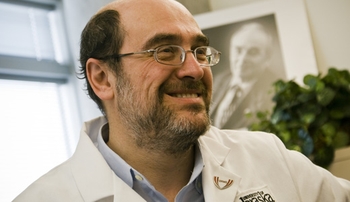In the next year, UNeMed Corp., plans to help launch several new startup companies that have sprung from UNMC research.
Among those is “Neuro10-9 Pharma Inc.,” which will be led by Alexander “Sasha” Kabanov, Ph.D., D.Sc., Parke-Davis Professor in Pharmaceutics and director of the Center for Drug Delivery and Nanomedicine (CDDN), and Zagit Gaymalov, Ph.D., deputy director for translational research at the CDDN.
 |
Alexander “Sasha” Kabanov, Ph.D., D.Sc. |
Below Dr. Kabanov tells us more.
Why did you decide to start a company?
We aim to create innovative pharmaceuticals and working on the basics is not enough. We need to translate the federal support we enjoy into products that can improve health. Given the type of research — there is a long road for research and development — which can only be supported through commercial venues. That is why we started this company.
Your nanomedicine research has potential ramifications on several disease fronts. Why did you choose to focus on obesity and stroke?
We saw that the unmet needs in these fields of health care are large, as is the potential upside.
How do your drugs work?
In our obesity work, we focus on the hormone, Leptin, which controls appetite. In most people, the transmission of Leptin to the brain is unimpeded but for the obese, it is hindered. We have created a form of Leptin that can overcome this hindrance and this helps regulate appetite control. We are in the preclinical development phase of this drug.
Our stroke drug limits damage caused by stroke as it delivers an antioxidant protein to the brain that feeds on the oxidants that cause a lot of damage in strokes. We hope this drug will be superior to the current stroke treatment medicine because it could be used by more people. The current treatment can only be administered to a limited population and within a narrow timeframe. Our drug has proven effective in animal models and now we must move into more advanced trials.
How has UNeMed helped you?
UNeMed is quite forward looking. The staff has adopted the streamlined innovative licensing methods that have proven effective elsewhere and we benefit from this. UNeMed also helps with market research analysis of business plans and this lets us develop viable commercial strategies for our drugs.